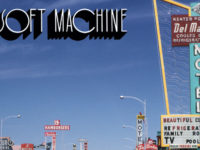Another Soft Machine concert recording from their 70s peak has made it to official release, and as the Softs were such fearless musicians on the stage, this is a welcome event.
Høvikodden 1971 (Cuneiform Records) puts into the public realm for the first time both nights of a performance at the Henie-Onstad Art Center in a suburb of Oslo, Norway on February 27 and 28 of 1971. The second evening’s concert had been previously released but out of print for a long time, while the first night had never been made available.
The classic lineup of Mike Ratledge (keyboards), Robert Wyatt (drums, vocals), Hugh Hopper (bass) and Elton Dean (saxophone) had by this time been together for well over a year and was a well-oiled machine by this time. Along with Miles Davis at the same time, Soft Machine was both innovating this new, fundamentally instrumental and high improvisational electric music that came to be known as ‘jazz fusion,’ and spreading its gospel to rock audiences around the world.
Høvikodden 1971 comes eighteen years after Cuneiform put out other concert tapes from the classic Soft Machine lineup, Grides, which captured the band four months earlier. This later one marked probably their first performance in Norway, and it was an audio-visual performance as the band played while films were being projected in the performance hall.
Another point of context is that Fourth was released the very month these dates were played, so naturally, all four of its songs are represented here, as was most of Third. The thing about Soft Machine live albums is that since they relied so much on instinct, a song wasn’t ever played exactly the same way twice. That meant that these concert performances were often significantly deviant from the studio performances of the same songs that such releases could stand on their own as distinctive additions to the catalog. Even their masterpiece studio album Third from less than a year earlier was partly ‘live.’
Robert Wyatt has been celebrated a lot more for his compositions and his wispy voice but the man was also elite on the drums, able to navigate the quartet around turbulent waters and make nuanced moves effortlessly. By the summer of 1971, Wyatt will have departed, the creative differences between him and the rest of the band having gotten too divergent by then. But in the winter of 1971, those differences served to spark tension in the music that lent it an urgency and risk-taking that resulted in some of the best music this band had ever made.
Soft Machine played two sets per day, over two days. The set list for each day was identical to the other day, sequence and all, with the exception of “Slightly All The Time” played a second time with more conciseness and energy on February 28 for the encore. There wasn’t much other deviation in the format of how the songs were played, though the “Facelift” intro stretched out a couple of minutes longer the earlier rendition, while the second go around of “Teeth” was similarly extended, as can happen in the heat of improvisation.
“Facelift” begins softly as Ratledge slowly settles in, ends up with Wyatt dominating and Ratledge letting loose a signature Lowrey organ solo run as Hopper is harmonizing right with him in real time. Dean doesn’t even enter until the song is already segueing into “Virtually,” then he takes over for the first half of the song, the energy come crashing down and in its wake is Hopper’s fuzz bass wandering and growling about a keyboard-created haze.
Ratledge attacks “Slightly All The Time” with a greater jazz sensibility, as Wyatt is practically playing conductor from behind his drum kit, setting the accents and rhythmic changes using power and the absence of power to set the tone. Toward the end though, he fully takes the reigns and pushes the whole band to rock out.
“Fletcher’s Blemish” is unadulterated free jazz that tests the limits of group interplay, and signals a direction the band would pursue further post-Wyatt. Dean’s “Neo-Caliban Grides” was part of the Softs’ setlist at the time even though it doesn’t appear on any Soft Machine studio album, but will soon show up on Dean’s debut solo album later that year. The intro holds most interest, where Dean and Ratledge have a dissonant face-off.
For “Out-Bloody-Rageous,” the group strips out the psychedelic, atmospheric intro of the studio version and gets right down to business, leading into a psychedelic, ambient outro featuring Wyatt performing echoing vocal improv that blends in splendidly with the instruments. Unfortunately, the vocal spot was the only occasion for his singing, as not even “The Moon In June” was on the setlist by this time (it wasn’t on Grides, either). None of the other songs played here bore his composing credit, another clue that Wyatt was on his way out.
Along with “Pigling Bland,” “All White” is an early preview of the Fifth album released the following year and Ratledge acquits himself well on the Fender Rhodes, a keyboard that’s more common than what he generally favors. More interesting is the drumming because Wyatt wasn’t around for the studio version, and here in this early form, he’s much more dynamic than his replacement Phil Howard was to later be.
The bass riff on “Kings and Queens” hews close to the arrangement heard on Fourth, but with Dean and Ratledge engaging closer together. “Teeth” is the aspirational, multi-sectioned Ratledge piece that kicks off Fourth, where the lack of a horn section on the studio version is countered by Wyatt’s commanding presence. They even slipped in a quick “Freedom Jazz Dance” quote.
The remastering job is generally quite good, crisp with a lack of extraneous noises — a smaller crowd no doubt helped with that — though Dean comes off slightly subdued in the mix. Three hours is a lot of music to sit through, but this band hits hard and is always going for the jugular. Soft Machine’s peak roster playing at peak performance is reason enough to plunk down for if this boundary-pushing style of jazz-rock is your thing.
Get Høvikodden 1971 from Bandcamp.
*** Soft Machine CDs and vinyl on Amazon ***



